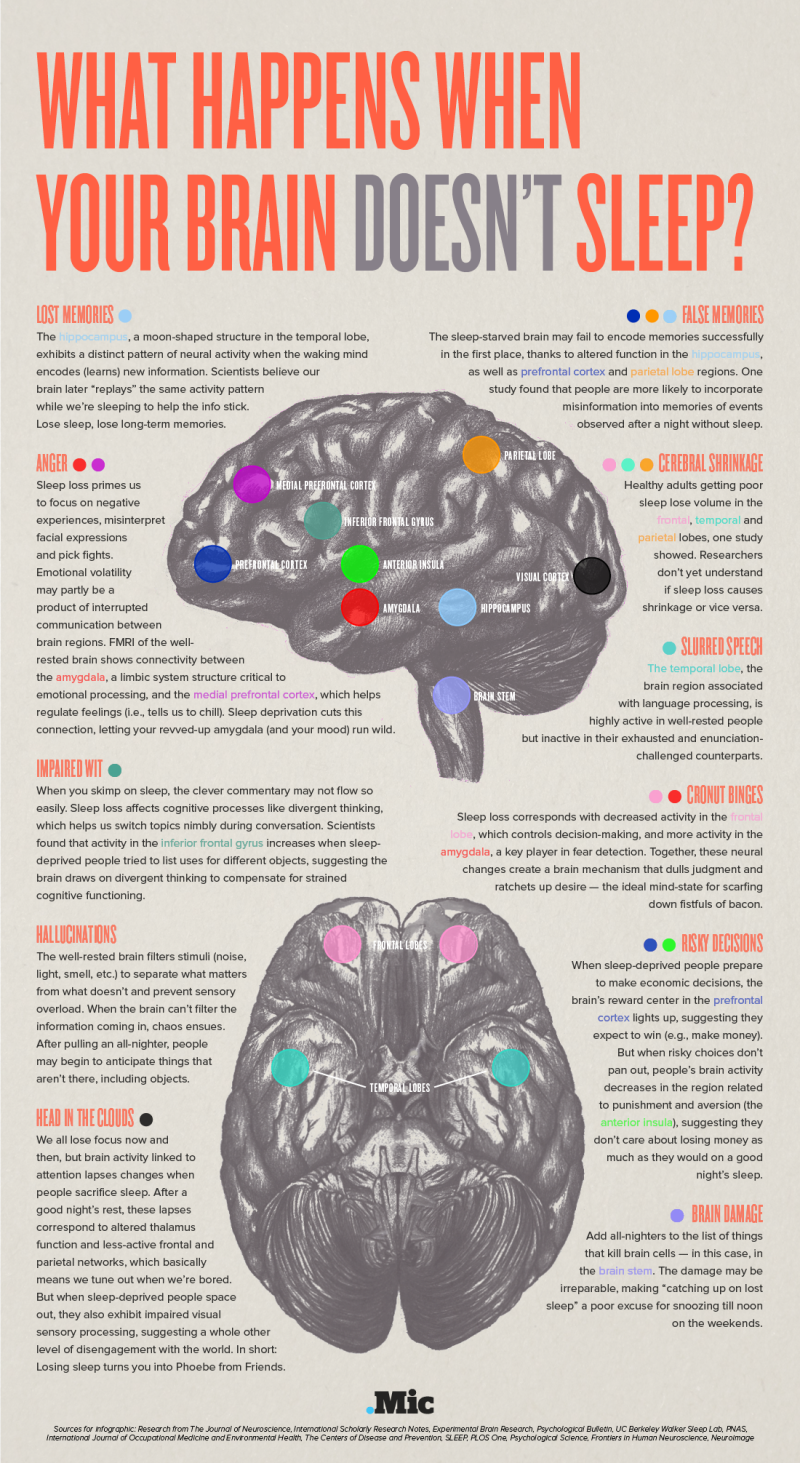What Happens to Your Brain When You Don't Sleep

By:
You know you have a hard time functioning when you're running low on sleep.
You're cranky, sluggish, tired. But what's actually going on in your brain when you feel this way? How hard is your brain working when you're sleep deprived?
An infographic from Science.Mic on LifeHacker gives you a pretty good idea.
 Science.Mic/Lifehacker - lifehacker.com
Science.Mic/Lifehacker - lifehacker.com
Let's break it down
Anger
You get angry more easily when you're tired because your amygdala — the part of your brain that processes emotions — takes over. Lack of sleep disrupts the amygdala's connection with other parts of the brain responsible for regulating emotions.
Lost memories
Ever get that fuzzy feeling when you don't get enough sleep? Where it feels harder to remember things? Blame the hippocampus, your memory center. It acts like a record skipping when you don't get enough sleep. The hippocampus is one of the first parts of the brain to deteriorate in Alzheimer's patients.
False memories
If you are functioning on less sleep, you find it harder to separate fake memories from real ones. And you can blame the hippocampus again, as well as the prefrontal cortex, which plays a big role in many brain functions, including focus.
Cerebral shrinkage
Frequent loss of sleep correlates with cerebral atrophy, specifically a shrinkage of your frontal, temporal, and parietal lobes. That's not a good thing, as these areas control functions such as movement, judgment, behavior, speaking and language, knowing right from left, reading, and understanding relationships.
Slurred speech
Lack of sleep can cause you to slur your speech, even if you're not drunk. That's because sleep deprivation affects your temporal lobe, which controls language processing. It's why you should plan to get enough sleep the night before delivering a big speech.
Impaired wit
Science says you're less funny if you're sleep deprived. You lose some of your ability to deftly switch between topics, draw interesting parallels, and all the other things you do when you're being witty.
Poor judgment
Think "cronut binges," according to the graphic. When you're tired, your judgment is impaired while your desire for whatever you're craving is increased, meaning you'll make poor decisions in all areas, including health. One classic example: After a long workday following a night without sleep, you'll find it much easier to order a pizza than to cook a healthy meal.
Hallucinations
You'd have to be awake for days to experience visual hallucinations caused by lack of sleep, but a reported 80 percent of sleep-deprived people have. When you're tired, your brain loses its ability to filter stimuli, meaning you may see something that isn't really there.
Risky decisions
Definitely don't try to make any sort of money-based decisions when you're tired. The part of your brain that makes big decisions is the prefrontal cortex, which also controls your impulses. Being sleepy is like letting your prefrontal cortex get lazy on you, allowing you to make Amazon purchases that you will probably regret as soon as they arrive.
Head in the clouds
Have you ever apologized for being "spacey" because you were tired? That's a common side effect of being sleep deprived. It's all linked to your visual cortex. If your visual cortex is a boat, losing sleep is like cutting off the rope that ties the boat to the dock, leaving you drifting in the ocean.
Brain damage
Pulling one all-nighter is not likely to give you lasting brain damage. But if you make it a regular occurrence, you're going to damage your brain stem over the long run. Your brain stem does a lot. It's like the major roadway that connects info from your body to the major parts of your brain. It's one part of your body you don't want to damage.
How much sleep should you get?
It varies per person, but, generally, if you're an adult aged 18 to 64, the National Sleep Foundation recommends seven to nine hours a night. Some people feel well-rested after seven hours; some need more. Figure out what works best for you.
